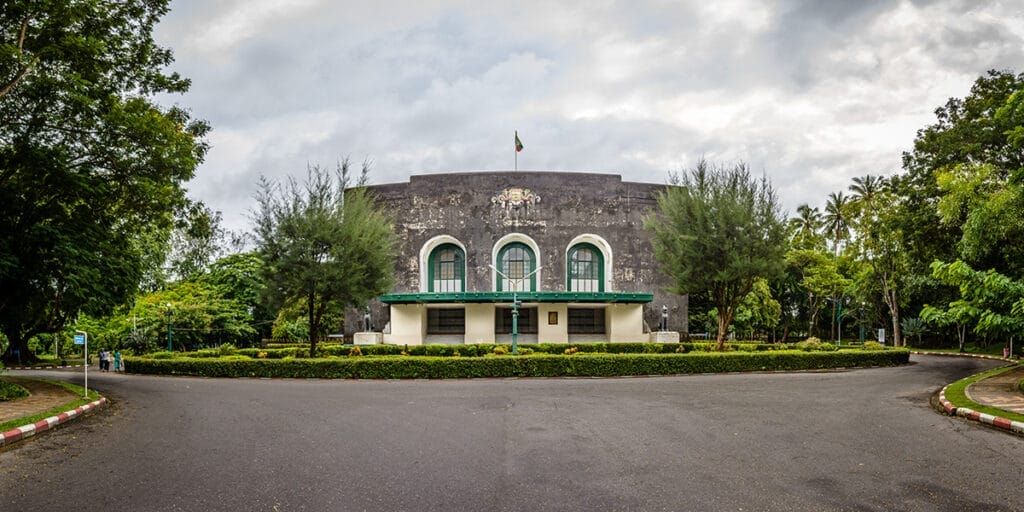Banner: The old library at Kyoto University’s Center of Southeast Asia Studies.
The research funding and support for Burma Studies has always been scarce, even more so jobs in the field. Support is often indirect, Burma being the “something else” in comparative work where the main interest is in the “other country.” Even this modest attention has paled to support for work on China, Japan, the Koreas (or just Korea if you are reading this in Malaysia!). The country is so often in economic downturns and civil war that the domestically generated research environment is even worse, with the added constraint of tight state control in periods when the military is in power (which has been most of the period since 1962).
One problem with this is it has allowed foreign commercial agendas considerable leverage over the shaping of the field. Everything from oil companies to alcoholic beverage companies have set national agendas on how to deal with the country. Usually this means pressure to invest until such point that the military in Burma does something well beyond the pale, which is something that they have proved to be peculiarly good at, so many times. But over the years, divestment campaigns have been particularly successful at challenging companies doing business in the country, in part because compared to other potential markets, the Burmese market is so small and complicated already. Unless there is major change and something more promising now, that what had been put in place with the 2008 Constitution, most (Western) foreign companies will not be back.
The Asia commercial lobby is a different beast altogether. Japan wages now a great game with China for influence in Asia that has overlapped with the Western fear of growing Chinese say in the world economy and politics, hence the second Quad. Where it can without jeopardising other relations, the Japanese government will look the other way, as it often has, on problematic policies of other Asian states aside from the PRC. As the old generation of Burma hands in Japan gives way to a newer generation, with one foot in government bureaus and the other in universities, the Japanese State-Academic Complex (JSAC) will likely see pressure on academics in the country to hide the transgressions of the Burmese military in the years ahead, misrepresent the Rohingya genocide as just a case of ethnic cleansing, and denigrate the ethnic insurgencies as anarchic in an effort to soften the climate for commercial reinvestment to out-compete China. Burma Studies in many countries has always been the gloved hand of state intelligence. Sadly, in the years ahead the JASC’s influence on studies of Burma will see increasing efforts to please the generals and the Myanmar Foreign Ministry and undermine academic work that seeks to educate and inform without a state agenda. Commercial agendas and state policy will shape “fact” rather than have to deal with the inconvenience of serious academic critique.

The Convocation Hall at Yangon University dated June 2017. Photo: Aung Myat, Shutterstock
Ironically, given how much Western propaganda (and admittedly some of the actions of the PRC itself regarding Chinese Studies abroad) have fostered the image of a PRC that bends the truth about Asia, the huge investments by the PRC in education, research, and academic positions related to Burma and Southeast Asia have led China to displace Japan (and Southeast Asia outside of Burma) as the main centres for research on China’s problematic neighbour. A combination of an inability to micro-shape the rapid scale of growth of research on the country, clear limits on how far research should go, and a need for genuine intelligence in a difficult time in Burma has led to a huge production of research, but unfortunately much of it in Chinese. While, again, state agendas will always triumph, as Japan securitizes its own Burma Studies at least there will be a potential and equally strong if not stronger PRC body of work to balance analyses out. The West of course, so distant now no longer in just geography, but also in interest, resources, and moral legitimacy (the decolonisation of knowledge) can no longer offer this. The ‘Pivot to Asia’ is more fiction than fact and Burma will never be important enough to the US to be put on the front burner. While Australia has a clear security interest to invest in Burma Studies and freer academic climate, its own universities have suffered, perhaps irreversibly from a chronic lack of funding.
Unfortunately for the Rohingya, the changing Japanese academy and the limits placed on other Asian academies by their states or commercial interests, or both, will mean that they will have to rely for support on the more distant humanitarian voices. Some from the West will still try to help. In increasingly there will be voices also from an increasingly globally-concerned Africa, which is familiar with the kind of tragedies that mal-governance and state violence produced by people like the Burmese generals and the kinds of shadowy creatures who work tirelessly to aid their image. It will always be possible that the wealthier Muslim states in the Near and Middle East will show more interest or that Indonesia and Malaysia might show more interest in morality than economy when it comes to putting pressure on their ASEAN partner. After seven years of exile, however, most Rohingya in the camps will not likely see that day. Arguably the best hope for the Rohingya is in the PRC, already the centre of gravity for Burma Studies in Asia now, acting in the interests of regional harmony, by finding a new solution. They certainly have the expertise, the resources, and a compelling motivation to do it.
Mike Charney
SOAS, University of London

